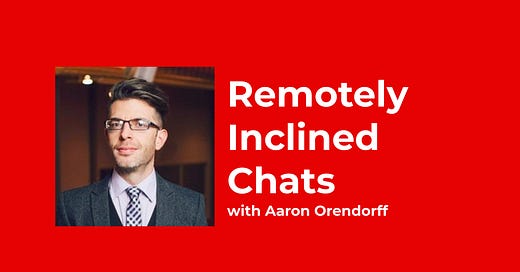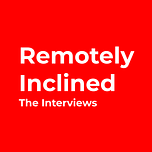Hi,
Welcome to Remotely Inclined, a newsletter for people who run businesses remotely. If you’d like to sign up, you can do so here. Want to share your feedback? Take this short survey. Or just read on…
Aaron Orendorff learned to be a content marketer from the church. After getting a masters of divinity and working at a multisite church in Oregon, he learned the basics of storytelling, creating emotional connections with people, and public speaking and writing. He spun that experience into a content marketing agency called IconiContent, and he ran editorial at Shopify Plus remotely for years.
Now a VP of Marketing and a partner at Common Thread Collective, a digital growth agency, Aaron helps ecommerce and direct-to-consumer companies tell their story with high quality content.
In this Chat, Aaron shares how he cultivates close relationships remotely and how he builds a sense of emotional connection with people he’s never met in person.
Creating emotional connections remotely
When he joined Shopify, the company was vast majority in-office (this was years before Shopify’s major remote work announcement).
To build emotional connections with people, Aaron focused on being present in every digital channel possible.
The tactics Aaron used are:
Starting in Slack, offering encouragement, praise, ideas, or comments in random channels throughout the company.
Working on a multi-platform “stack,” he would then connect with people on LinkedIn that he talked to on Slack, sending them a DM with an interesting note. From there, he’d do the same thing via email.
As the conversation continued, he’d look for opportunities for a phone call, which meant he’d get access to their phone number.
Once he had their phone number, he’d send a text message to continue “showing up” in different ways.
This strategy, though, can get annoying for people. The key is to ensure that you’re truly helping the person, not just messaging them. Focus on their problems, issues, or questions.
Liking this post? I’d be grateful if you shared it
Building a brand
Aaron’s experience in the church taught him the power of being as present as possible. When he left the church and wanted to get into content marketing, he focused on guest posting in as many blogs as possible.
He would write anything he could about marketing principles to be published anywhere possible - he didn’t question whether it was a small or big publication.
Over time, publishing in small blogs and building a network helped him land major publications like Fast Company and Entrepreneur. This work became cumulative, helping him connect with people like Tommy Walker who connected him to his opportunity to join Shopify Plus.
The final word
“There’s power in appearing more present and more real than you really are when you diversify your channel approach to interactions.”
Remotely Inclined Chats with Aaron Orendorff
Transcript edited for brevity and clarity.
Stefan: Welcome, Aaron! Let’s kick it off with what you’re up to at Common Thread Collective?
Aaron: I joined Common Thread Collective in February 2020 as the VP of Marketing. I’m also a partner. It’s a digital growth marketing agency for ecommerce and direct to consumer companies. I fell in love with it based on my past experience at Shopify Plus.
You were in the ministry before getting into tech. What was that transition like?
I’d love to say it was a calculated move, but that’s a lie. I invested myself wholeheartedly in my first career. I went to seminary, got a masters in divinity, focused on public speaking and preaching, and worked at a multiside campus church in Portland, Oregon. Then I proceeded to burn that career down. I found myself unemployed and unemployable in rural southern Oregon.
I’d cut my teeth, mentally speaking, writing in church ministry. Which is where I learned, as crass as it sounds, that it doesn’t matter if you’re right, it matters if you create an emotional connection with your audience. When you’re able to articulate their objections and point of view better than they can, they turn the corner and think maybe there is another way. And whether we’re talking bout conversion in the religious sense or in the way tech uses it, the principles are the same.
All communication is sales - trying to get what’s in my heart and mind into someone else’s in a way that makes them say “yes”.
So I found these incredibly transferable skills. I had a suspicion that was later confirmed that people were selling things on the internet, but couldn’t write or communicate well. So I jumped primarily into content marketing, and one thing led to another. Over the past 7 years.
You mentioned that when you joined Shopify they weren’t as open to remote work as they are now. How did you build relationships remotely?
To get to Shopify, I wrote like a madman - anywhere and everywhere - for a 2-3 year period. I tried to get my name on as many sites as I possibly could, from niche marketing to mainstream like Business Insider, Fast Company, Entrepreneur, or Mashable. This was to essentially trick the world into thinking that I was somebody. And this is even more important today in a remote working environment.
What I used to do is every time an article would go live, I would tag people who were featured in the article, asking them to check that I quoted them right. Not a big ask, just for a bit of curiosity. I cast these wide nets over and over again. And when you do that enough times - when you show up enough - one of them hits. That’s how I ended up connecting with one of the most influential people in my life, Tommy Walker, who was at the time the editor in chief of Shopify Plus.
How did you cultivate relationships at Shopify remotely?
When I was writing in other publications, I was in multiple places and multiple sites. It creates this powerful social proof illusion in someone’s mind. It’s the same principle when it comes to remote working, especially when it comes to working in a company that’s predominantly in offices.
What I found was the more involved I got in various Slack channels that I didn’t necessarily need to be a part of, the more I went out into those channels and started mixing it up in the comments. Then I would track down the people I really liked. I could find them on LinkedIn and send them a DM there. Or I’d find any excuse to relevantly email a few people at once or doing one on one.
Then I always look for an opportunity to actually call somebody to get their phone number. Then try texting them. What I did was the same sort of experience where suddenly I was in all these different places.
It feels more like I’m a real person with a much deeper relationship than I genuinely have simply because of that multiplicity of touch points.
I then thought about other days to do this. And my new favorite one: Rather than writing out long instructions to my team or a long request to other people, I’ll do a Zoom recording / screenshot. That way my face is in the video and it’s 3-5 minutes long.
Is there a limit to this? Does it ever get annoying for people?
It can. But at first, I would say 70% of my time was spent going out into their world. I would go to their channels, pay attention to what they are saying, and offer solutions to their problems as much as I can.
The vast majority of the time I’m showing up, I’m not coming with a problem or a request.
What’s your advice for newbie remote entrepreneurs?
There’s power in appearing more present and more real than you really are when you diversify your channel approach to interactions.
Perhaps the crowning achievement of this is building up to the sacred phone number. People are incredibly busy. So I am always building up to the excuse to ask for a phone number, not to call them, but to cross into the intimacy of text. I want it to be something where I intrude, but to cross that final barrier. So maybe I can possibly send them a phone recorded video of me celebrating something. It’s building this good will.
Amazing, thank you for your insights!
You can get in touch with Aaron on Twitter or LinkedIn.















Share this post